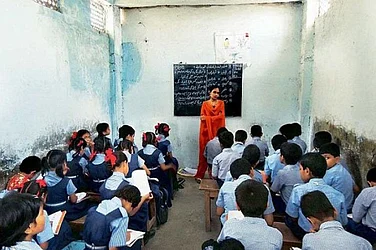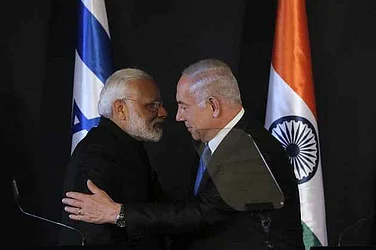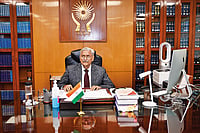The Covid-19 pandemic may have caused immense misery and devastation to millions of people around the world, but it has proved to be a boon for many enterprising teachers in India. Prolonged lockdowns gave a fillip to different online businesses like e-commerce, e-retail etc. But one sector where it worked marvels was e-education which has flourished at an unprecedented rate since the pandemic. Even now when many of the lockdown-fuelled industries are facing some form of recession, the online teaching industry seems to be flourishing, as evidenced by the growing popularity of online teachers.
The revolution of online education in India has led to the phenomenal rise of 'star teachers' such as Vikas Divyakirti, Khan Sir, Alakh Pandey, Awadh Ojha, and many others. Celebrities in their own right, the popularity of these teachers rivals that of actors, cricketers, and others of their ilk. With swarms of selfie seekers mobbing them in public and millions of followers on social media platforms, these new-age teachers are not only famous but also minting big bucks.
Most of these 'star teachers' have become entrepreneurs running their own empires and more and more ed-tech or e-education start-ups are now figuring on the list of unicorns (an unlisted company with a market valuation of $1 billion) companies. Alakh Pandey's start-up 'Physics Wallah', for one, recently became the 101st unicorn in the country.
A Delhi University academician Vijender Singh Chauhan, known for his unique style of conducting mock interviews, tells Outlook, “Teachers had become 'celebrities' even before Covid-19 but their popularity skyrocketed to a new level during the pandemic.”
So far, five edtech companies have become unicorns in India. Explaining their revenue models, Prof. Vijender says that while companies have adopted different types of models, not all are ideal. In one model, he explains, teachers are making the most of their image and popularity on social platforms. He says that people now want to be teachers just to stay in the limelight.
Gone are the days when teaching was considered a humble, social profession. Teaching has become a profitable vocation today with teachers earning salaries that can rival that of top CEOs in the country. According to Bengaluru-based market research firm Redseer, the online education market in India is expected to grow by 50 percent to $5 billion during 2021-2025. With this, the global e-learning market size is projected to grow to $370 billion by 2026. The tremendous interest of students in education technology and e-learning has attracted huge investments in this sector. The growing demand for online education has made India the second-largest funding market for edtech globally.
'Physics Wallah' founder Alakh Pandey whose company is among the five that became unicorns in India during the Covid-19 pandemic, says, "With the demand for online education constantly increasing, online teaching is the only option left.” On the increasing attraction of children towards online education, Alakh says, “Offline makes it difficult for students to make the right choice. It is easy online for the students to choose the right option.”
Alakh says that with the introduction of online education, students are able to save a lot of time. “If a lecture is missed, it can be watched later also,” he adds. He, however, believes that the day is not far off when there will be harmony between online and offline and students will have the option of hybrid mode.
The easy availability of smartphones and the internet in recent years has played a key role in setting off the new trend of online education. According to a report by Deloitte, India will have one billion smartphone users by 2026. Not only this, according to the Economic Survey of India 2021-22, 83 crore people are using the Internet in the country. The report says that wireless internet data usage in India has grown seven-fold to 32,397 petabytes in 2021 from around 4,200 petabytes in 2018.
“The demand for smartphones is expected to increase with the adoption of high-quality internet,” the report further says. Nonetheless, many questions remain about the future of online education. Teachers’ involvement in controversies, the glut of wrong content on YouTube, irresponsible statements by the new-age tutors for cheap popularity, etc. are among the top issues that raise doubts about online coaching.
On the future of online education, Awadh Ojha, the founder of IQRA IAS, a well-known coaching institute for UPSC aspirants, says, “Everything changes. People will accept it within five to ten years." He, however, insists that if a child gets an opportunity to get a good offline education, he will never switch to online studies.
Offline education, however, looks like a fading reality today. As of now, celebrity teachers like 'Khan Sir' are making hay while the sun of online teaching shines attracting lakhs of students preparing for competitive exams like NEET-JEE, SSC, UPSC and Banking. Rajesh Sharma, a student from Ghazipur in Uttar Pradesh, tells Outlook, “Usually, most of us go to Prayagraj or Kanpur to prepare for competitive exams, but I did not want to go there. I went to Patna because Khan sir teaches here." What makes "Khan Sir" so special? Rajesh says, “His language is not artificial. He explains to us in the language we understand. Unlike the teachers who taught me in my childhood, I can connect with Khan Sir even in a crowd of hundreds of students.” Another student, Vinayak Singh, who went to Prayagraj from Ballia to prepare for competitive examinations, echoes the same feelings about Awadh Ojha.
This local connect with students seems to have greatly contributed to these teachers turning into overnight stars. “Teachers are now becoming celebrities. I never thought I would get such recognition as a teacher and find myself surrounded by people taking selfies with me at a marketplace.” Chauhan, however, says that it is not just the teachers who are making or trying to become a brand. There are many professionals from other fields who are also constantly in the limelight. “Now, you will see a bureaucrat accompanied by a camera team that shoots their every move to show it to the public.”
Awadh Ojha, nevertheless, tells Outlook that he still teaches students the way he used to do before. “I have not even made any change in my outfit. I believe that a teacher's acceptance should be based on her knowledge, not glamour," he adds.
Physics Wallah's Alakh Pandey adds that there has been a very rich tradition of guru-shishya in the country. “Yes, there was a time when the halo around the teachers faded a bit but online teaching has revived the old tradition. It is a matter of joy that now teachers are becoming icons.”
But if stardom comes, can controversies be far behind? Some of the star teachers have been named in the FIRs for allegedly giving inflammatory speeches through their virtual classes. Earlier this year, a curious controversy arose over the name of Khan Sir, one of the most popular online teachers based in Patna. He has kept his name a closely guarded secret. Some believe that his real name is Amit Singh while others think it is Faizal Khan. He has chosen not to clear the mist over his name so far.
Incidentally, Khan Sir was accused of inciting violence during the RRB-NTPC exam results earlier this year when thousands of students came out on the streets of Patna and elsewhere to protest against the results of a railway recruitment board examination. One of his videos was even banned on YouTube while one of his channels, which has about two crore students connected, had to be shut down for a week during the controversy.
Awadh Ojha has also been accused of disturbing peace between two communities through his videos in the past. He has been seen supporting AAP chief Arvind Kejriwal from one of his platforms during the 2015 Delhi elections. At that time, he raked up a controversy by comparing Kejriwal to Mahatma Gandhi. He also organized a cycle satyagraha from Lucknow to Delhi with the Progressive Samajwadi Party demanding an additional chance for the candidates in UPSC for which he weas even taken into custody in Noida at the time.
There are some teachers who are accused of peddling misinformation and divisive comments on their YouTube channels in a bid to get cheap popularity. A teacher who grooms students for UPSC examinations tells Outlook on condition of anonymity that there are many online teachers who deliberately make objectionable comments. “Nowadays, it has become an easy and effective way to gain popularity in the virtual and real world,” he says.
Awadh Ojha calls it 'parasite fame’. Apparently, there are some teachers who are doing more than teaching to get fame. Looking at the multitude of teachers on YouTube, it can be said that online education has become blatantly commercial. “I feel bad seeing all this. It is not right. After five years of hard work, we have reached this stage today. We have worked hard for students, taught them, motivated them," Alakh adds.
He advises the teachers to try to win the hearts of the children instead of running after fame and popularity. “Teachers are losing the reality in their desperate bid to go viral but they will have to give up their proclivity to garner cheap publicity," he states.
Statistics of online teaching predict a bright future for the industry. And with students approving of the teaching methods of 'modern gurus', the online education business is likely here to stay. Whether a welfare state should take some lessons from such experiments and create a modern model of public education in the new era is worth mulling over.


























